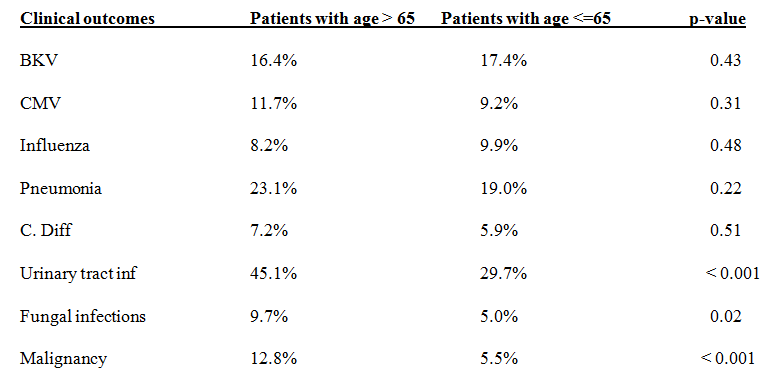Infectious Complications and Malignancy After Kidney Transplantation in the Elderly Population
L. Liriano-Ward, M. Parides, Y. Al Azzi, C. Pynadath, M. Ajaimy, P. Loarte, J. Graham, S. Greenstein, M. Le, H. Yaffe, M. Kinkhabwala, J. Rocca, E. Akalin
Montefiore Medical Center, New York, NY
Meeting: 2021 American Transplant Congress
Abstract number: 790
Keywords: Elderly patients, Infection, Kidney transplantation
Topic: Clinical Science » Infectious Disease » Kidney Infectious Non-Polyoma & Non-Viral Hepatitis
Session Information
Session Name: Kidney Infectious Non-Polyoma & Non-Viral Hepatitis
Session Type: Poster Abstract
Session Date & Time: None. Available on demand.
Location: Virtual
*Purpose: All patients, regardless of age, may benefit from renal transplantation due to improved quality of life and decreased mortality. However, elderly patients are at an increase risk of developing side effects related to immunosuppressive medications including infections and malignancy. We aim to evaluate clinical outcomes in recipients older than 65 years of age.
*Methods: This is a retrospective review of all patients over the age of 18 transplanted at our center from January 2013 to December 2018. We compared clinical outcomes including allograft and patient survival, as well as the development of infections (opportunistic and non-opportunistic) malignancy in patients older than 65 compared to younger patients.
*Results: Of the 806 patients analyzed, 201 (24.9%) were older than 65 years of age. The two groups had no statistically significant difference in terms of gender and race. Older patients were more likely to receive a deceased donor kidney transplant (90% vs. 80.3%, p=0.002) and less likely to receive thymoglobulin induction (<0.001). During a median follow up of 46.6 months (28, 65), as expected mortality was higher in older patients (20.4% vs. 7.1%, p=0.0001), but compared to younger patients, there was no difference in terms of death-censored graft loss (10% vs 10.4 %, p=0.85). Detailed analysis of infections revealed that there was no difference in terms of BKV and CMV viremia, pneumonia, influenza and c. diff between the two groups. However, older patients had more fungal, urinary tract infections, and malignancy. 9% of elderly patients developed a fungal infection, the most common being PJP pneumonia (44%), followed by candida infection (39%), and cryptococcal infection (17%). 27% of elderly patients developed a malignancy, which included skin cancer (37%), prostate cancer (11%), breast cancer (7%), and colon cancer (7%), Kaposi’s sarcoma (7%), among others occurring less frequently.
*Conclusions: While recipients older than 65 had an increase incidence of fungal, urinary tract infections, and malignancies, their graft survival was similar to that of younger patients.
To cite this abstract in AMA style:
Liriano-Ward L, Parides M, Azzi YAl, Pynadath C, Ajaimy M, Loarte P, Graham J, Greenstein S, Le M, Yaffe H, Kinkhabwala M, Rocca J, Akalin E. Infectious Complications and Malignancy After Kidney Transplantation in the Elderly Population [abstract]. Am J Transplant. 2021; 21 (suppl 3). https://atcmeetingabstracts.com/abstract/infectious-complications-and-malignancy-after-kidney-transplantation-in-the-elderly-population-2/. Accessed July 1, 2025.« Back to 2021 American Transplant Congress

